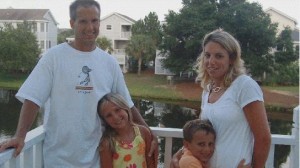My wife lost her ability to care for our children.
November 25, 2015Guest Blogger Brian Norton
Again I find there is so much to say but still not sure how much to reveal in an effort to protect Amy and the kids. My thought for today was to give a history of how things have progressed over the last few years. I am struggling, how do I keep this post short so people will not lose interest, how do I describe some of what is happening with Amy and our family, can I accurately describe the impact this disease has on our whole family? Does the community really understand how this disease effects the individual and family, do they know it’s not just about forgetting the names of loved ones, that it’s not about being old or young- it’s a brain disease that erases a person’s skills, ability, personality and independence. And although families provide love, care and support, much of what we do is watch the change take place.
There is a common scale identifying the 7 stages of the disease. Amy was diagnosed in March 2013 (age 43) and was already in mild to moderate dementia (Alz is a form of dementia). Many people navigate the first few stages of the disease without a diagnosis as they are able to compensate for ther losses. Amy’s case is similar to others in that we thought her changes were related to depression and the loss of her mother. She had become withdrawn and less social, she lost track of time, no longer took interest in what the kids were doing after school and no longer planned meals as she had in the past. The changes progressed and over the course of 2 years (prior to diagnosis) saw her repeat stories when talking with friends, unable to follow directions and become confused with simple instructions. She hit the side of the garage twice with the car, something that never happened in the prior 8 years and she had difficulty recalling information in response to questions, even about the kids. Amy knew something was wrong and was frustrated, as was I. Our friends were concerned. Megan was calling me regularly at work after school and covering for Amy in some instances. It was a daily struggle. I do not recall if my discussion with Justin was pre or post diagnosis but it will stick with me forever when he finally revealed that Amy was getting lost while bringing him home from practice- he was directing her home.
We visited with several doctors and eventually made our way to the neurologist who diagnosed Amy. We moved in July 2013 so we could be closer to our families and it has been a whirwind ever since. The stress of finding a house, hoping Megan and Justin would adjust to new schools and being ‘the new kids’, overcoming the loss of friendships and a community that had become home to us. Amy was doing well and enjoyed looking at houses. She knew when she did not like a house but often commented that the homes were nice. She was still engaged but would not initiate conversation and tended to participate in a discussion, laughing or nodding and using short responses. Language can be compromised with Alz so Amy talked less, either because she could not find the words or she was aware of her struggle with language and wanted to disguise it from others. As in Atlanta, Amy had lost her ability to nurture and care emotionally for Megan and Justin. She no longer hugged and kissed them and did not ask how they were doing or what happened at school.

Today we are further down the Alz scale from 2013. Amy tends to be less engaged when around us, focusing her attention on a favorite TV show. She is more anxious and at times paces because she is not sure what she should be doing. I do not know if she can still read and have noticed her signature has become less legible. She does not write and I think her inability to process and plan (executive function) prevents her from writing. Amy’s mood swings are more frequent and come at any time. We have recently experienced periodic episodes of extreme anger and colorful language and she does like to go to the store or the kids after school events. We have become attuned to the look that precedes a change in mood and work hard at the art of distraction and redirection. We have learned to talk to Amy so she is involved in a discussion and the three of us have learned to run through a list of possible needs so that Amy is comfortable. We provide more prompts and simple direction, such as time to brush teeth, and offer hugs and kisses which are occasionally accepted. We live moment to moment and take joy in the occasional laugh or smile. We are a family and although it’s different than before, we are still together.

